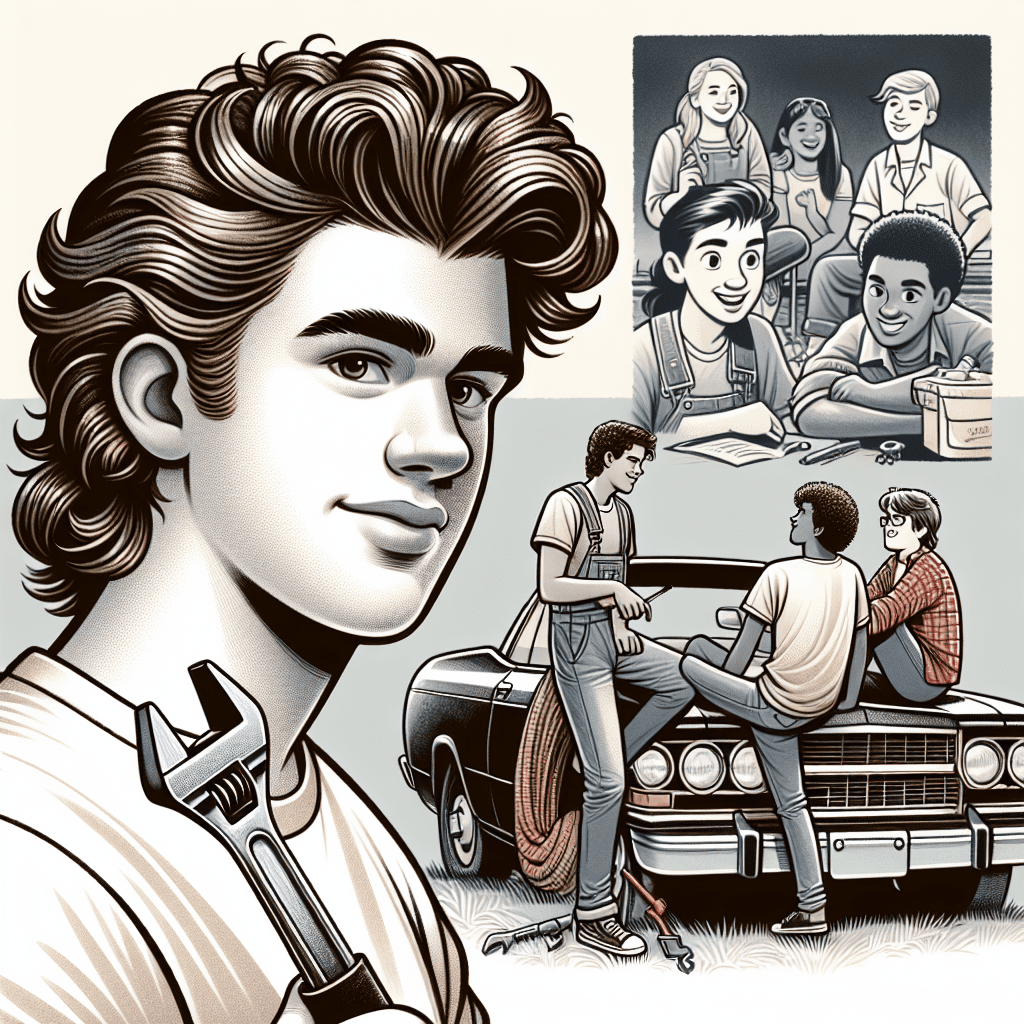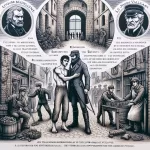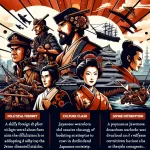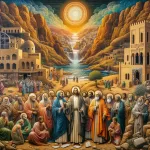-
Sisällysluettelo
- Steve Randlen rooli The Outsidersissa
- Uskollisuuden ja ystävyyden teemat Steve Randlen hahmossa
- Sosioekonomisen aseman vaikutus Steve Randleen
- Steve Randlen luonteen kehitys romaanin aikana
- Steve Randlen ja muiden hahmojen välisten suhteiden merkitys
- Identiteetin teeman tutkiminen Steve Randlen kautta
- Steve Randle 1960-luvun nuorisokulttuurin heijastajana
- KYSYMYKSET JA VASTAUKSET
"Steve Randle: Randle: Uskollinen ystävä identiteetin ja kuulumisen navigoinnissa jakautuneessa maailmassa."
Steve Randle on hahmo S.E. Hintonin romaanista "The Outsiders". Hän kuuluu Greasers-ryhmään, joka on työväenluokkaisten teinien ryhmä 1960-luvun Amerikassa. Stevelle on ominaista hänen uskollisuutensa ystävilleen ja hänen kova ulkokuorensa, ja hän toimii usein koomisen helpotuksen lähteenä ryhmässä. Steven ympärillä käsiteltäviä teemoja ovat ystävyys, luokkataistelu ja identiteetin etsintä, jotka heijastavat Greasersin laajempia yhteiskunnallisia kysymyksiä. Hänen suhteensa muihin hahmoihin, erityisesti hänen läheinen ystävyytensä Sodapop Curtisin kanssa, korostavat toveruuden ja tuen merkitystä nuoruuden ja sosiaalisen jakautumisen haasteista selviytymisessä.
Steve Randlen rooli The Outsidersissa
S.E. Hintonin romaanissa "The Outsiders" Steve Randle nousee esiin merkittävänä hahmona, jonka rooli edistää laajempia teemoja ystävyydestä, lojaalisuudesta ja murrosiän kamppailuista. Työväenluokan nuorista koostuvan Greasers-ryhmän jäsenenä Steve ilmentää teini-ikäisen elämän monimutkaisuutta jakautuneessa yhteiskunnassa. Hänen hahmonsa kietoutuu tiiviisti tarinan kudokseen, ja se antaa tietoa Greaser-jengin dynamiikasta ja heidän vuorovaikutuksestaan kilpailevien ryhmien, erityisesti varakkaita luokkia edustavien Socien, kanssa.
Steve esitetään Sodapop Curtisin, yhden tarinan keskushenkilöistä, läheisenä ystävänä. Heidän ystävyydelleen on ominaista syvä side, joka kuvastaa Greasereiden keskuudessa usein esiintyvää lojaalisuutta ja toveruutta. Tämä suhde on keskeinen, sillä se korostaa ystävyyden merkitystä ympäristön haasteista selviytymisessä. Steven lojaalisuus ystäviään kohtaan on horjumatonta, ja hän toimii usein heidän tukenaan erityisesti konfliktien ja jännitteiden aikana. Tämä lojaalisuus ei ole pelkästään henkilökohtainen piirre, vaan se heijastaa myös Greasereiden kollektiivista identiteettiä, sillä he luottavat toistensa emotionaaliseen ja fyysiseen tukeen maailmassa, joka vaikuttaa usein vihamieliseltä.
Lisäksi Steven hahmo toimii linssinä, jonka kautta lukija voi tutkia identiteetin teemaa. Monien ikätovereidensa tavoin Steve kamppailee yhteiskunnallisten odotusten paineiden ja yksilöllisyytensä vahvistamisen halun kanssa. Hänen vuorovaikutuksensa muiden hahmojen kanssa paljastaa murrosikäisten sisäiset kamppailut, kun he pyrkivät määrittelemään itsensä ulkoisten ristiriitojen keskellä. Esimerkiksi Steven suhde omaan perheeseensä on kireä, mikä lisää hänen hahmoonsa uuden kerroksen. Tämä perhejännite heijastelee laajempaa irtautumisen teemaa, joka läpäisee Greasereiden elämän ja korostaa sosioekonomisen aseman vaikutusta henkilökohtaisiin suhteisiin.
Sen lisäksi, että Steve on ystävä ja tuen lähde, hän ilmentää myös kapinahenkeä, joka on ominaista Greaser-elämäntyylille. Hänen uhmakkuutensa sosialisteja ja heidän elämäänsä määrääviä yhteiskunnallisia normeja vastaan kuvaa laajempaa konfliktia näiden kahden ryhmän välillä. Kapinassa ei ole kyse vain fyysisestä vastakkainasettelusta, vaan siihen kuuluu myös sossujen ylläpitämien arvojen, kuten materialismin ja etuoikeuksien, hylkääminen. Steven tekojen ja asenteiden kautta Hinton kritisoi tehokkaasti hahmoja erottavaa sosiaalista kerrostuneisuutta ja saa lukijat pohtimaan luokkaerojen vaikutuksia.
Lisäksi Steven luonteen kehitys romaanin aikana korostaa kasvun ja kypsyyden teemaa. Tarinan edetessä hän kohtaa erilaisia haasteita, jotka pakottavat hänet kohtaamaan uskomuksiaan ja arvojaan. Tämä itsensä löytämisen matka kuvastaa laajempaa nuoruuden kokemusta, jossa yksilöiden on selvitettävä identiteettinsä ja ihmissuhteidensa monimutkaisuutta. Steven kehitys ei ole vain henkilökohtainen matka, vaan se heijastaa myös Greasereiden kokemaa kollektiivista kasvua heidän kohdatessaan olosuhteensa.
Yhteenvetona voidaan todeta, että Steve Randlen rooli "The Outsiders" -elokuvassa on monitahoinen, sillä se edustaa ystävyyttä, uskollisuutta ja identiteetin etsintää yhteiskunnallisten haasteiden keskellä. Hänen hahmonsa rikastuttaa tarinaa tuomalla esiin murrosikäisten kamppailut jakautuneessa maailmassa, mikä viime kädessä edistää romaanin kestäviä teemoja. Steven kautta Hinton kehottaa lukijoita pohtimaan nuoruuden monimutkaisuutta, solidaarisuuden merkitystä ja yhteiskunnallisten jakolinjojen vaikutusta ihmissuhteisiin.
Uskollisuuden ja ystävyyden teemat Steve Randlen hahmossa
Kun Steve Randlen hahmossa tutkitaan uskollisuutta ja ystävyyttä, käy selväksi, että nämä teemat ovat kiinteästi kietoutuneet hänen identiteettinsä kudokseen. S.E. Hintonin romaanissa The Outsiders (Ulkopuoliset) Greasersiin kuuluva Steve ilmentää sosiaalista ryhmäänsä määrittelevää toveruutta. Hänen suhteensa muihin Greasereihin, erityisesti Ponyboy Curtisiin ja Two-Bit Mathewsiin, korostavat syviä siteitä, jotka voivat muodostua vastoinkäymisten edessä. Nämä siteet eivät ole vain pinnallisia, vaan niiden juuret ovat yhteisissä kokemuksissa ja keskinäisessä tuessa, jotka vahvistavat lojaalisuuden merkitystä heidän elämässään.
Kertomuksen edetessä Steven lojaalisuus joutuu koetukselle eri tilanteissa, mikä paljastaa hänen luonteensa syvyyden. Esimerkiksi konfliktin aikana kilpailevan ryhmän, Socsin, kanssa Steve seisoo lujana ystäviensä rinnalla ja osoittaa, että hänen uskollisuutensa on horjumaton. Tämä järkkymättömyys ei ole vain osoitus hänen henkilökohtaisista arvoistaan vaan myös osoitus Greasersin kollektiivisesta identiteetistä. Steven ja hänen ystäviensä osoittama uskollisuus on vastaus heidän kohtaamiinsa yhteiskunnallisiin paineisiin, ja se luo yhtenäisyyden tunteen, joka ylittää heidän yksilölliset kamppailunsa. Tällä tavoin Hinton havainnollistaa, miten lojaalisuus voi toimia suojamekanismina, joka edistää kestävyyttä ulkoisten haasteiden edessä.
Lisäksi Steven ystävyyssuhteille on ominaista keskinäinen kunnioitus ja ymmärrys. Hänen vuorovaikutuksensa esimerkiksi Ponyboyn kanssa paljastaa hänen persoonallisuutensa hoivaavan puolen. Steve toimii usein suojelijana, joka opastaa Ponyboyta murrosiän monimutkaisissa asioissa ja heidän ympäristönsä karuissa realiteeteissa. Tämä dynamiikka korostaa ystävyyden teemaa, mutta myös mentoroinnin roolia heidän suhteissaan. Kun he selviytyvät myrskyisässä maailmassaan, heidän toisilleen tarjoamastaan tuesta tulee pelastusrengas, joka vahvistaa ajatusta siitä, että aitoa ystävyyttä leimaavat epäitsekkyys ja halu tukea toisiaan.
Siirryttäessä henkilökohtaisesta näkökulmasta lojaalisuuden ja ystävyyden laajempiin seurauksiin on tärkeää tunnistaa, miten nämä teemat resonoivat Greaser-yhteisön kontekstissa. Hahmojen välille muodostuneet siteet toimivat mikrokosmoksena laajemmista yhteiskunnallisista ongelmista, joita he kohtaavat, kuten luokkataistelusta ja väkivallasta. Tässä valossa Steven lojaalisuus ystäviään kohtaan voidaan nähdä kapinana niitä yhteiskunnallisia normeja vastaan, jotka pyrkivät jakamaan heidät. Asettamalla ihmissuhteensa ympäristön asettamien odotusten edelle Steve ja hänen ikätoverinsa haastavat vallitsevan tilanteen ja havainnollistavat ystävyyden muuttavaa voimaa.
Lojaalisuuden teema ei myöskään ole täysin mutkaton. Kerronnan edetessä sokean lojaalisuuden seuraukset tulevat esiin erityisesti konfliktinhetkillä, jolloin hahmot joutuvat kohtaamaan vaikeita valintoja. Steven kokemukset heijastavat jännitettä ystäville osoitetun lojaalisuuden ja heidän maailmassaan ilmenevien moraalisten dilemmojen välillä. Tämä monitahoisuus lisää syvyyttä hänen hahmoonsa ja osoittaa, miten vaikeaa on säilyttää lojaalisuus ja selviytyä samalla elämän ankarista realiteeteista.
Yhteenvetona voidaan todeta, että uskollisuuden ja ystävyyden teemat ovat keskeisiä Steve Randlen hahmon ymmärtämisessä elokuvassa "The Outsiders". Suhteidensa kautta Greasers-tovereihin Steve on esimerkki uskollisuudesta kumpuavasta voimasta ja ystävyyden syvällisestä vaikutuksesta identiteetin muotoutumiseen. Kun Steve kamppailee murrosiän ja yhteiskunnan odotusten haasteiden kanssa, hänen matkansa on koskettava muistutus näiden teemojen tärkeydestä, sillä ne edistävät vastustuskykyä ja solidaarisuutta vastoinkäymisiä kohtaavien yksilöiden keskuudessa. Lopulta Hintonin kuvaus Steve Randlesta kehottaa lukijoita pohtimaan uskollisuuden ja ystävyyden pysyvää merkitystä omassa elämässään.
Sosioekonomisen aseman vaikutus Steve Randleen
S.E. Hintonin romaanissa "The Outsiders" Steve Randlen hahmo on vakuuttava kuvaus sosioekonomisen aseman vaikutuksesta yksilön identiteettiin ja ihmissuhteisiin. Koska Steve kuuluu Greasers-ryhmään, jolle on ominaista alempi sosioekonominen asema, hänen kokemuksiinsa ja vuorovaikutukseensa vaikuttavat syvästi hänen maailmaansa määrittävät taloudelliset erot. Tämä konteksti ei ainoastaan muokkaa hänen hahmoaan, vaan myös korostaa laajempia luokkataistelun ja sosiaalisen jakautumisen teemoja, jotka ovat läsnä koko tarinassa.
Steve Randle, jota kuvataan kekseliäänä ja lojaalina ystävänä, ilmentää niitä vaikeuksia, joita monet taloudellisesti heikossa asemassa olevat nuoret kohtaavat. Hänen roolinsa Greaser-jengissä ei ole pelkästään toverillinen, vaan se kuvastaa myös solidaarisuuden välttämättömyyttä niiden välillä, joilla on samanlaisia sosioekonomisia haasteita. Greaserit, jotka ovat usein yhteiskunnan syrjäyttämiä ja leimaamia, löytävät lohtua ja voimaa kollektiivisesta identiteetistään. Steven uskollisuus ystävilleen, erityisesti Ponyboylle ja Sodapopille, korostaa yhteisön merkitystä heidän selviytyessään sosiaalisen asemansa aiheuttamista vaikeuksista. Tämä side on olennainen heidän selviytymiselleen sekä henkisesti että fyysisesti, kun he kohtaavat varakkaampaa luokkaa edustavien kilpailevien socien jatkuvan väkivallan uhan.
Lisäksi Steven hahmo havainnollistaa sisäisiä ristiriitoja, jotka johtuvat sosioekonomisista eroista. Vaikka hän on ulkoisesti kova, hänen haavoittuvuutensa tulee esiin itsetutkiskelun hetkillä, jolloin hänen sosiaaliseen asemaansa liittyvät epävarmuudet paljastuvat. Paine mukautua Greaser-elämäntyylin odotuksiin on usein ristiriidassa hänen henkilökohtaisten pyrkimystensä ja toiveidensa kanssa. Tämä jännite korostuu erityisesti hänen vuorovaikutuksessaan sossujen kanssa, jossa hän kamppailee riittämättömyyden ja kaunan tunteiden kanssa. Jyrkkä kontrasti Greasereiden ja Socsin välillä vahvistaa Steven kamppailua, sillä hän liikkuu maailmassa, jossa hänen arvonsa usein aliarvioidaan pelkästään hänen taloudellisen taustansa perusteella.
Lisäksi sosioekonomisen aseman teemaa tarkastellaan tarkemmin Steven ja muiden hahmojen välisten suhteiden kautta. Hänen ystävyyttään Ponyboyn ja Sodapopin kanssa leimaa yhteinen ymmärrys heidän kamppailuistaan, mutta se paljastaa myös lojaalisuuden ja kunnianhimon monimutkaisuuden heidän yhteiskuntaluokkansa rajoissa. Steve on tyytyväinen Greaser-identiteettiinsä, mutta Ponyboyn pyrkimykset erilaiseen elämään luovat kuilun, joka haastaa heidän ystävyytensä. Tämä dynamiikka havainnollistaa, miten sosioekonominen asema voi vaikuttaa ihmissuhteisiin ja johtaa sekä solidaarisuuteen että konflikteihin sellaisten henkilöiden välillä, joita muuten yhdistävät yhteiset kokemukset.
Lisäksi Steven luonteen kehitys romaanin aikana heijastaa luokkajaon laajempia yhteiskunnallisia vaikutuksia. Kertomuksen edetessä ympäristön karu todellisuus pakottaa Steven ja hänen ystävänsä kohtaamaan olosuhteensa, mikä saa heidät kasvamaan ja tiedostamaan itsensä. Heidän elämäänsä läpäisevä väkivalta ja tragedia toimivat muutoksen katalysaattoreina, jotka saavat Steven arvioimaan uudelleen identiteettiään ja tekemiään valintoja. Tämä kehitys kuvastaa monien samankaltaisissa tilanteissa elävien nuorten kamppailua, ja se tuo esiin mahdollisuuden sietokykyyn ja muutokseen sosioekonomisen aseman asettamista rajoitteista huolimatta.
Yhteenvetona voidaan todeta, että Steve Randlen hahmo elokuvassa "The Outsiders" on koskettava osoitus sosioekonomisen aseman vaikutuksesta yksilön identiteettiin ja ihmissuhteisiin. Randlen kokemusten kautta Hinton havainnollistaa tehokkaasti luokkataistelun, lojaalisuuden ja henkilökohtaisen kasvun monimutkaisuutta ja korostaa viime kädessä sitä syvällistä vaikutusta, joka taloudellisilla olosuhteilla voi olla nuorten yksilöiden elämään. Steven matka heijastelee hänen henkilökohtaisten haasteidensa lisäksi myös laajempia yhteiskunnallisia kysymyksiä, jotka ovat edelleen esillä nykypäivän keskusteluissa luokasta ja identiteetistä.
Steve Randlen luonteen kehitys romaanin aikana
S.E. Hintonin romaanissa "The Outsiders" Steve Randlen hahmo kuvaa vaikuttavasti nuoruuden monimutkaisuutta ja nuorten yksilöiden kohtaamia vaikeuksia jakautuneessa yhteiskunnassa. Greasersin jäsenenä Steve on paitsi Ponyboy Curtisin läheinen ystävä myös hahmo, joka ilmentää lojaalisuuden, ystävyyden ja identiteetin etsinnän teemoja. Steven kehitys nivoutuu tarinan kudokseen koko tarinan ajan ja heijastaa laajempaa sosiaalista dynamiikkaa ja henkilökohtaisia haasteita, jotka määrittävät hahmojen elämää.
Aluksi Steve esitellään itsevarmana ja hieman ylimielisenä teininä, joka tunnetaan taidoistaan autojen kanssa ja läheisestä suhteestaan parhaaseen ystäväänsä Sodapopiin. Tämä varhainen kuvaus tekee hänestä tyypillisen Greaserin, joka on ylpeä ulkonäöstään ja kyvyistään. Tarinan edetessä käy kuitenkin selväksi, että Steven uhmakkuus peittää alleen syvempiä epävarmuuksia ja pelkoja. Hänen vuorovaikutuksensa muiden hahmojen kanssa paljastaa hänen haavoittuvamman puolensa, erityisesti kriisinhetkillä, kuten rähinän jälkimainingeissa ja Johnnyn kuolemaa seuraavissa traagisissa tapahtumissa. Nämä kokemukset toimivat katalysaattoreina Steven luonteen kehittymiselle, sillä ne saavat hänet kohtaamaan ympäristönsä karun todellisuuden ja elämän haurauden.
Lisäksi Steven suhde Ponyboyhin on ratkaisevan tärkeä kuva hänen kasvustaan. Aluksi hän näyttää suhtautuvan hieman torjuvasti Ponyboyn itsetutkiskelevaan luonteeseen ja kiusaa tätä usein tämän herkkyydestä. Kertomuksen edetessä Steve alkaa kuitenkin ymmärtää empatian ja ymmärryksen merkityksen. Tämä muutos näkyy erityisesti tavassa, jolla hän vastaa Ponyboyn kamppailuun identiteetin ja kuulumisen kanssa. Romaanin loppuun mennessä Steven hahmo on kehittynyt tukevampaan rooliin, mikä osoittaa ystävyyden merkityksen ja emotionaalisen yhteyden tarpeen levottomina aikoina.
Henkilökohtaisen kasvun lisäksi Steven hahmo kuvastaa myös laajempia luokkataistelun ja yhteiskunnallisen jakautumisen teemoja. Greaserina hän on hyvin tietoinen Greasereiden ja varakkaan kilpailevan jengin, Socsin, välisestä vihamielisyydestä. Tämä tietoisuus muokkaa hänen maailmankuvaansa ja vaikuttaa hänen toimintaansa koko tarinan ajan. Esimerkiksi konfliktin aikana Steven lojaalisuus ystäviään kohtaan on usein ristiriidassa hänen halunsa saada parempi elämä, mikä korostaa sisäistä ristiriitaa, jota monet nuoret kohtaavat sosioekonomisten erojen ristitulessa. Hänen hahmonsa toimii mikrokosmoksena laajemmista yhteiskunnallisista ongelmista ja havainnollistaa, miten ulkoiset olosuhteet voivat muokata henkilökohtaista identiteettiä ja ihmissuhteita.
Lisäksi Steven kehitystä leimaa kasvava vastuuntunto. Kertomuksen edetessä hän alkaa ymmärtää tekojensa painoarvon ja niiden vaikutuksen ympärillään oleviin ihmisiin. Tämä oivallus on erityisen koskettava jengin dynamiikan yhteydessä, jossa lojaalisuus ja uhrautuminen ovat ensiarvoisen tärkeitä. Steven matkaa kohti kypsyyttä korostaa hänen kasvava tietoisuutensa väkivallan seurauksista ja siitä, että on tärkeää tehdä valintoja, jotka heijastavat hänen arvojaan.
Yhteenvetona voidaan todeta, että Steve Randlen hahmonkehitys koko "The Outsiders" -teoksen ajan on vivahteikas tutkimus nuoruudesta, ystävyydestä ja identiteettitaistelusta jakautuneessa maailmassa. Randlen kehitys itsevarmasta Greaserista empaattisemmaksi ja vastuuntuntoisemmaksi yksilöksi kiteyttää ne haasteet, joita nuoret kohtaavat etsiessään kuulumista ja ymmärrystä. Steven kautta Hinton välittää tehokkaasti viestin siitä, että henkilökohtainen kasvu syntyy usein vastoinkäymisten kautta ja että todellinen vahvuus piilee kyvyssä luoda yhteys toisiin ihmisiin elämän monimutkaisuuden keskellä.
Steve Randlen ja muiden hahmojen välisten suhteiden merkitys
S.E. Hintonin romaanissa "The Outsiders" Steve Randlen hahmo on keskeinen hahmo, jonka suhteet muihin hahmoihin valaisevat laajempia teemoja ystävyydestä, lojaalisuudesta ja murrosiän kamppailuista. Greasersin jäsenenä Steve ilmentää nuoruuden monimutkaisuutta jakautuneessa yhteiskunnassa, ja hänen vuorovaikutussuhteensa muiden kanssa paljastavat toveruuden ja ristiriitojen vivahteet, jotka määrittävät heidän elämäänsä.
Steven suhde Ponyboy Curtisiin on erityisen merkittävä, sillä se korostaa vastoinkäymisten keskellä syntyviä siteitä. Ponyboy kamppailee usein identiteettinsä ja paikkansa kanssa Greaser-yhteisössä, mutta Steve antaa hänelle vakautta ja tukea. Heidän ystävyydelleen on ominaista heidän kohtaamiensa haasteiden yhteinen ymmärtäminen, mikä synnyttää syvää lojaalisuuden tunnetta. Tätä yhteyttä korostavat entisestään heidän yhteiset kokemuksensa ympäristönsä ankarien realiteettien läpikäymisestä, minkä ansiosta he löytävät lohtua toistensa seurasta. Tämän suhteen kautta Hinton havainnollistaa ystävyyden merkitystä turvapaikkana ulkoisilta paineilta, jotka uhkaavat nujertaa heidät.
Lisäksi Steven ja hänen parhaan ystävänsä Sodapop Curtisin välinen dynamiikka tuo hänen hahmoonsa uuden kerroksen. Steven ja Sodapopin välistä suhdetta leimaa veljeyden tunne, joka ylittää pelkän ystävyyden. Heidän vuorovaikutuksestaan käy ilmi leikkisä mutta syvä yhteys, joka korostaa tarinaa läpäisevää lojaalisuuden teemaa. Steven ihailu Sodapopin charmia ja karismaa kohtaan on ilmeistä, ja tämä ihailu johtaa usein hilpeisiin hetkiin, jotka helpottavat heidän elämänsä jännitteitä. Suhde kuitenkin korostaa myös lojaalisuuden monimutkaisuutta, sillä Steve joutuu toisinaan keskelle Curtisin perheessä syntyviä ristiriitoja. Tämä jännite havainnollistaa laajempaa teemaa perhesiteistä ja niiden mukanaan tuomista uhrauksista, kun hahmot selvittävät lojaalisuuttaan sekä ystäville että perheelle.
Ponyboyn ja Sodapopin suhteiden lisäksi Steven vuorovaikutus muiden Greasereiden, kuten Dallyn ja Two-Bitin, kanssa korostaa entisestään toveruuden merkitystä heidän ryhmässään. Jokainen hahmo tuo ainutlaatuisen näkökulman Greaserina olemisen kollektiiviseen kokemukseen, ja Steven rooli välittäjänä auttaa usein ylläpitämään harmoniaa heidän välillään. Hänen kykynsä luoda yhteys toisiin ihmisiin joko huumorin tai empatian kautta osoittaa ihmissuhteiden merkityksen yhteenkuuluvuuden tunteen edistämisessä. Tämä yhteenkuuluvuuden tunne on elintärkeää greasereille, jotka tuntevat itsensä usein yhteiskunnan syrjäytyneiksi, ja Steven ihmissuhteet muistuttavat yhtenäisyydestä löytyvästä voimasta.
Steven ihmissuhteissa on kuitenkin omat haasteensa. Heidän ympäristönsä paineet johtavat usein konflikteihin, jotka koettelevat hahmojen välisiä siteitä. Esimerkiksi Greasersin ja Socsin välinen kilpailu luo jännitteisen ilmapiirin, joka voi rasittaa ystävyyssuhteita. Steven kokemukset näiden ristiriitojen selvittämisestä paljastavat lojaalisuuden haurauden ja ulkoisten voimien vaikutuksen ihmissuhteisiin. Kun hahmot kohtaavat väkivallan ja yhteiskunnallisen jakautumisen todellisuuden, heidän suhteensa ovat sekä voimanlähde että mahdollinen kiistakohta.
Yhteenvetona voidaan todeta, että Steve Randlen suhteet muihin "The Outsiders" -teoksen hahmoihin ovat olennainen osa ystävyyden, lojaalisuuden ja murrosiän monimutkaisuuden ymmärtämistä. Vuorovaikutuksen kautta Ponyboyn, Sodapopin ja muiden Greasereiden kanssa Hinton havainnollistaa näiden suhteiden syvällistä vaikutusta hahmojen elämään. Lopulta Steven kokemukset heijastavat nuoruuden yleismaailmallisia kamppailuja ja korostavat yhteyden merkitystä vastoinkäymisten voittamisessa.
Identiteetin teeman tutkiminen Steve Randlen kautta
S.E. Hintonin romaanissa "The Outsiders" Steve Randlen hahmo toimii kiehtovana linssinä, jonka kautta identiteettiteemaa voidaan tutkia. Työväenluokkaisten teini-ikäisten Greasers-ryhmän jäsenenä Steve ilmentää murrosikäisen identiteetin muodostumisen vaikeuksia ja monimutkaisuutta jakautuneessa yhteiskunnassa. Hänen hahmonsa ei ole merkittävä vain Greasersin kontekstissa, vaan se heijastaa myös laajempia teemoja, jotka liittyvät kuulumiseen, lojaalisuuteen ja itseymmärryksen etsimiseen ulkoisten paineiden keskellä.
Steve Randle esitellään romaanin päähenkilön Ponyboy Curtisin läheisenä ystävänä, ja hänen vuorovaikutuksensa muiden hahmojen kanssa paljastaa paljon hänen omasta identiteetistään. Hänelle on ominaista lojaalisuus ystäviään kohtaan ja kiihkeä omistautuminen Greaser-elämäntyylille. Tämä lojaalisuus on ratkaiseva osa hänen identiteettiään, sillä se muokkaa hänen ihmissuhteitaan ja vaikuttaa hänen päätöksiinsä koko kertomuksen ajan. Stevelle Greaser ei ole pelkkä etiketti, vaan se on olennainen osa hänen persoonaansa. Tämä kuulumisen tunne tarjoaa hänelle yhteisön ja tukijärjestelmän, mutta se myös rajoittaa hänet sosiaalisen ryhmänsä jäykkien odotusten sisään. Yksilöllisten halujen ja ryhmäidentiteetin välinen jännite on romaanin toistuva teema, ja Steven hahmo on esimerkki tästä kamppailusta.
Lisäksi Steven identiteettiä mutkistavat entisestään hänen toiveensa ja unelmansa. Toisin kuin jotkut hänen ikätoverinsa, jotka tyytyvät olosuhteisiinsa, Steve haluaa jotain enemmän. Hänen kunnianhimoinen halunsa työskennellä autojen parissa ja hänen kiinnostuksensa mekaniikkaan korostavat hänen kaipuutaan tulevaisuuteen, joka ylittää hänen sosioekonomisen asemansa asettamat rajoitukset. Tämä halu itsensä kehittämiseen ja henkilökohtaiseen kasvuun on tärkeä osa hänen identiteettiään, sillä se kuvastaa yleistä nuoruuden kamppailua ainutlaatuisen elämänpolun löytämiseksi. Häntä ympäröivät yhteiskunnalliset rajoitteet kuitenkin usein estävät häntä toteuttamasta näitä pyrkimyksiään, mikä kuvaa ristiriitaa henkilökohtaisen identiteetin ja yhteiskunnallisten odotusten välillä.
Pyrkimystensä lisäksi Steven suhteet muihin hahmoihin valaisevat hänen identiteettiään entisestään. Hänen ystävyyssuhteensa Ponyboyn kanssa on erityisen merkittävä, sillä se osoittaa toveruuden merkityksen itsetuntemuksen muotoutumisessa. Heidän vuorovaikutuksensa kautta lukijat näkevät, miten ystävyys voi tarjota sekä tukea että haasteita. Steve esimerkiksi rohkaisee usein Ponyboyta, mutta hän myös ruumiillistaa sopeutumispaineet, jotka voivat tukahduttaa yksilöllisyyden. Tämä kaksinaisuus heidän suhteessaan korostaa identiteetin muodostumisen monimutkaisuutta, sillä se korostaa henkilökohtaisten toiveiden ja ikätovereiden vaikutuksen välistä vuorovaikutusta.
Lisäksi Steven kokemukset väkivallasta ja konflikteista toimivat taustana hänen identiteettinsä tutkimiselle. Greaserit joutuvat usein yhteenottoihin Socsin kanssa, joka on kilpaileva ryhmä, joka edustaa varakkaampaa luokkaa. Nämä kohtaamiset pakottavat Steven kohtaamaan paitsi omat uskomuksensa lojaalisuudesta ja kunniasta myös laajemmat yhteiskunnalliset jakolinjat, jotka muokkaavat hänen maailmaansa. Heidän elämäänsä läpäisevä väkivalta toimii katalysaattorina itsetutkiskelulle ja saa Steven kyseenalaistamaan arvot, joita hän pitää tärkeinä, ja identiteetin, jonka hän on rakentanut sosiaalisen ryhmänsä rajojen sisällä.
Yhteenvetona voidaan todeta, että Steve Randlen hahmo elokuvassa "The Outsiders" on rikas identiteettiteeman tutkimus. Uskollisuutensa Greasereille, paremman tulevaisuuden tavoittelunsa ja suhteidensa kautta Steve ilmentää murrosikäisen identiteetin muodostumisen monimutkaisuutta. Hänen matkansa kuvastaa yleismaailmallista kamppailua yksilöllisten toiveiden ja yhteiskunnallisten odotusten välisistä jännitteistä, ja lopulta se korostaa yhteisön ja ystävyyden syvällistä vaikutusta itseymmärryksen etsintään.
Steve Randle 1960-luvun nuorisokulttuurin heijastajana
Steve Randle, S.E. Hintonin uraauurtavassa romaanissa "The Outsiders" esiintyvä hahmo, kuvastaa 1960-luvun nuorisokulttuuria ja kiteyttää aikakauden kamppailut, toiveet ja sosiaalisen dynamiikan. Työväenluokkaisten teini-ikäisten Greasers-ryhmän jäsenenä Steve ilmentää nuoruuden monimutkaisuutta aikana, jota leimasivat taloudellinen epätasa-arvo, sosiaaliset levottomuudet ja nuorten identiteettitajun kehittyminen. Hänen hahmonsa korostaa nuorten kohtaamia haasteita jakautuneessa yhteiskunnassa ja havainnollistaa myös ystävyyden, lojaalisuuden ja yhteenkuuluvuuden etsinnän yleismaailmallisia teemoja.
1960-luvun kontekstissa Steve Randle edustaa teini-ikäistä, joka kamppailee yhteiskunnallisten odotusten ja itsenäisyyden tavoittelun paineiden kanssa. Vuosikymmenelle oli ominaista merkittävä kulttuurinen muutos, kun nuoret alkoivat vahvistaa yksilöllisyyttään ja haastaa perinteisiä normeja. Steven vuorovaikutus ikätovereidensa kanssa paljastaa Greasereiden toveruuden ja solidaarisuuden merkityksen, sillä he löytävät lohtua yhteisistä kokemuksistaan vaikeuksista ja syrjäytymisestä. Tämä veljeyden tunne näkyy erityisesti hänen suhteessaan romaanin päähenkilön Ponyboy Curtisin kanssa, kun he selviytyvät yhdessä ympäristönsä monimutkaisuudesta. Heidän siteensä kautta Hinton havainnollistaa, miten ystävyys voi toimia turvapaikkana elämän ankaralta todellisuudelta, tarjota emotionaalista tukea ja tarkoituksen tunnetta.
Lisäksi Steven hahmo kuvastaa laajempia kapinallisuuden ja vastarinnan teemoja, jotka läpäisivät nuorisokulttuurin tuona aikana. Greaserit, jotka ovat usein riidoissa varakkaampien sosialistien kanssa, symboloivat aikakauden luokkataistelua. Steven uhmakkuus yhteiskunnan normeja vastaan ja hänen halukkuutensa puolustaa ystäviään kuvastavat nuorten kasvavaa tyytymättömyyttä, sillä he tunsivat itsensä syrjäytyneiksi ja äänettömiksi. Tämä kapina ei ole pelkkää uhmakkuutta, vaan se on osoitus syvemmästä kaipuusta tunnustuksen ja kunnioituksen saamiseksi maailmassa, joka usein jättää huomiotta heidän kamppailunsa. Tällä tavoin Steve Randlesta tulee väline, jonka kautta Hinton tutkii identiteetin muodostumisen monimutkaisuutta ja halua saada hyväksyntää jäykässä sosiaalisessa hierarkiassa.
Kapinallisuuden teemasta siirryttäessä on tärkeää pohtia, miten Steven hahmo ilmentää myös nuoruuden viattomuutta ja haavoittuvuutta. Kovasta ulkomuodostaan ja uhmakkuudestaan huolimatta hän kamppailee epävarmuuksien ja pelkojen kanssa, jotka sopivat moniin nuoriin. Paineet mukautua maskuliinisuuden ja kovuuden odotuksiin jättävät hänet usein ristiriitaisiin tunteisiin. Tämä sisäinen kamppailu kuvastaa laajempia yhteiskunnallisia paineita, joita nuoret miehet kohtasivat 1960-luvulla. Heidän odotettiin usein tukahduttavan tunteensa ja omaksuvan kovan persoonan. Hinton kuvaa Steveä niin, että lukija voi tuntea hänen hahmonsa ja ymmärtää, että pinnan alla on nuori mies, joka yrittää selviytyä nuoruuden myrskyisistä vesistä.
Yhteenvetona voidaan todeta, että Steve Randle edustaa monipuolisesti 1960-luvun nuorisokulttuuria ja kiteyttää ystävyyden, kapinan ja haavoittuvuuden teemat. Hänen hahmonsa kautta S.E. Hinton antaa koskettavan kommentin haasteista, joita nuoret kohtasivat tämän mullistavan aikakauden aikana. Tutkimalla Steven ihmissuhteiden monimutkaisuutta ja hänen kamppailuaan identiteetistä ja hyväksynnästä Hinton kehottaa lukijoita pohtimaan nuoruuden universaaleja kokemuksia ja tekee Steve Randlesta ajattoman hahmon nuorten aikuisten kirjallisuuden maisemassa. Viime kädessä hänen hahmonsa resonoi sen pysyvän kuulumisen ja ymmärryksen etsinnän kanssa, joka edelleen määrittää nuoruuden kokemusta sukupolvien yli.
KYSYMYKSET JA VASTAUKSET
1. **Kysymys:** Kuka on Steve Randle elokuvassa "The Outsiders"?
**Vastaus:** Steve Randle on Greasersin jäsen, joka tunnetaan uskollisuudestaan ja läheisestä ystävyydestään Sodapop Curtisin kanssa.
2. **Kysymys:** Mikä rooli Stevellä on Greaser-jengissä?
**Vastaus:** Steve toimii ryhmän mekaanikkona ja auttaa autojen kanssa, mikä osoittaa hänen taitonsa ja kekseliäisyytensä.
3. **Kysymys:** Mikä on keskeinen Steve Randleen liittyvä teema?
**Vastaus:** Steveen liittyvä keskeinen teema on ystävyyden ja lojaalisuuden merkitys Greaser-yhteisössä.
4. **Kysymys:** Miten Steven suhde Sodapopiin vaikuttaa hänen luonteeseensa?
**Vastaus:** Steven suhde Sodapopiin korostaa Steven suojelevaa luonnetta ja syvää sidettä ystäviinsä, mikä korostaa veljeyden teemaa.
5. **Kysymys:** Miten Steve suhtautuu sosialisteihin?
**Vastaus:** Steve suhtautuu suuttumuksella sosialisteihin, mikä kuvastaa romaanissa vallitsevaa luokkaristiriitaa.
6. **Kysymys:** Miten Steven hahmo edistää "The Outsidersin" yleistä sanomaa?
**Vastaus:** Steven hahmo havainnollistaa nuoruuden kamppailuja ja sosioekonomisen aseman vaikutusta ihmissuhteisiin ja identiteettiin.
7. **Kysymys:** Mikä on Steven kannalta merkittävä hetki tarinassa?
**Vastaus:** Merkittävä hetki Stevelle tapahtuu rähinän aikana, jolloin hänen lojaalisuutensa Greasereille joutuu koetukselle, mikä tuo esiin toveruuden teeman. "The Outsiders" -elokuvassa Steve Randlea luonnehditaan Greaser-jengin lojaaliksi ja kekseliääksi jäseneksi, joka tunnetaan läheisestä ystävyydestään Sodapop Curtisin kanssa. Hänen roolinsa korostaa veljeyteen, lojaalisuuteen ja nuorison kamppailuihin jakautuneessa yhteiskunnassa liittyviä teemoja. Steven vuorovaikutus muiden hahmojen kanssa korostaa toveruuden merkitystä ja sosioekonomisen aseman vaikutusta identiteettiin ja ihmissuhteisiin. Lopulta Steve edustaa nuoruusiän monimutkaisuutta, kun hän selviytyy lojaalisuuden ja henkilökohtaisen kasvun haasteista jengien keskinäisen kilpailun ja yhteiskunnallisten odotusten keskellä.




